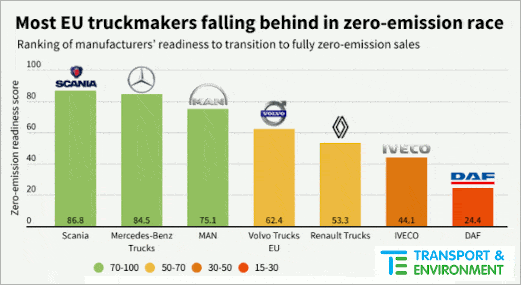
There are three European truck manufacturers - Mercedes-Benz Trucks,
Scania and MAN - which on the basis of their statements would be the
more ready to move to the commercialization of vehicles
zero emissions, selling only electric or hydrogen vehicles
by 2040, but - according to the European environmental organization
Transport & Environment (T&E), whose objective is the
Reducing the environmental impact of the transport sector -
would be very late in achieving this goal and
would risk losing market share to
American and Chinese competitors such as Tesla and BYD.
T&E found that if Scania, Mercedes-Benz Trucks and MAN
are the three European leaders on the basis of their ambitions
announced for the achievement of this goal, since all
and three aim for 100% new zero-emission vehicles by
2040, however - according to T&E - these companies do not seem to
keep up with their own strategies. So also for
Volvo Trucks which, if it is currently the market leader in
sales of battery electric trucks in Europe and the manufacturer with
the most ambitious target for 2030 (sales share of
zero-emission vehicles equal to 70% of the total), however - reports
the environmental organization - does not have a goal of 100%
sales of zero-emission vehicles and is investing in gas and
biofuels, which - highlighted Transport & Environment -
continue to emit CO2.
In particular, T&E has specified that Scania is in
Head of climate ambitions and strategies
of truck manufacturers, despite aiming to sell
In 2030 only 50% of electric or hydrogen vehicles, but have a
Very solid industrial strategy. Mercedes-Benz Trucks aims for
60% sales of zero-emission vehicles in 2030, but - in view
of T&E - there is a gap between its announcements and its plans
industrial having a weaker battery strategy and
still having to secure supplies of raw materials for
Batteries. For T&E, MAN also has a weaker strategy
to achieve its goal of zero emissions in the
2030 and plans to make a less extensive range of models
Electric. Renault Trucks follows and aims to reach zero
emissions of half of its sales by 2030, but - has
observed T&E - is also pursuing the production of vehicles
powered by gas and biofuels. IVECO and DAF producers would be
for T&E both without long-term objectives and would have
Invested little in battery supply chains and networks
charging.
"All European truck manufacturers - he said
Sofie Defour, freight director of T&E - say they are
ecological, but the reality is that less than half
of them are on track to reach zero emissions
and only through voluntary commitments. In the truck sector there is
A huge gap between manufacturers with a plan for complete
decarbonization and those without. The EU needs strict standards
on CO2 for trucks in order to bring the whole of European industry
in step with the times».
Defour also warned of the danger of loss of allowances
market that, according to T&E, would be run by producers
European companies such as Tesla and BYD that in the
Automotive market have already proven their ability
to rapidly increase the production of zero-emission cars.
"Tesla and BYD - warned Defour - are ready to repeat the
their success in the truck market, with California sent
A clear signal to truck manufacturers. This should make
Wake up calls for European legislators who do not
want investment in manufacturing and batteries
end up elsewhere. The EU must use its CO2 standards
of trucks to give certainty to heavy-duty vehicle manufacturers
so that they cut zero emissions and invest in Europe."
